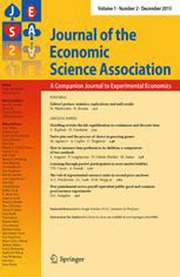Article contents
Facilitating efficient coordination in large groups: small incentive payments in nested groups
Published online by Cambridge University Press: 17 January 2025
Abstract
Most large real-world organizations contain multiple smaller groups, such as working groups within firms. However, can this sort of nested groups be used to alleviate coordination failures in the larger group? We report on a multi-player Stag Hunt experiment wherein we hierarchically structure a large group into mutually exclusive small groups. We offer varying incentive payments if efficient coordination is achieved at a large or small group level. The novelty of our design is that we hold the total payment size constant between treatments. In our nested incentive treatment, we reduce the reward for achieving large-group coordination by a small amount and reallocate the same amount to successful small-group coordination. The results reveal that incentive reallocations privileging small groups facilitate efficient large-group coordination in the nested group structure.
Information
- Type
- Original Paper
- Information
- Copyright
- Copyright © Economic Science Association 2020
Footnotes
Electronic supplementary material The online version of this article (https://doi.org/10.1007/s40881-020-00093-2) contains supplementary material, which is available to authorized users.
References
- 1
- Cited by

